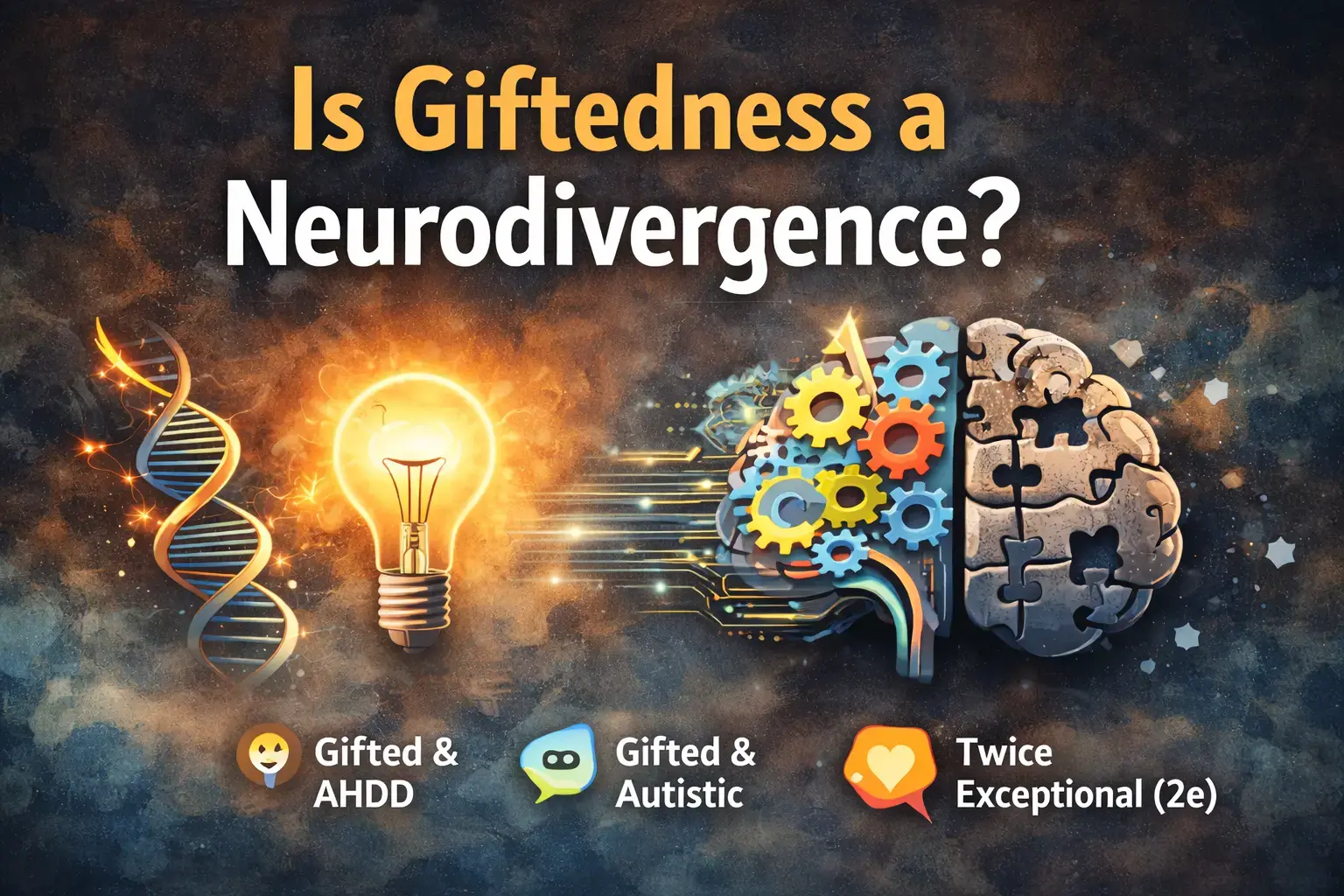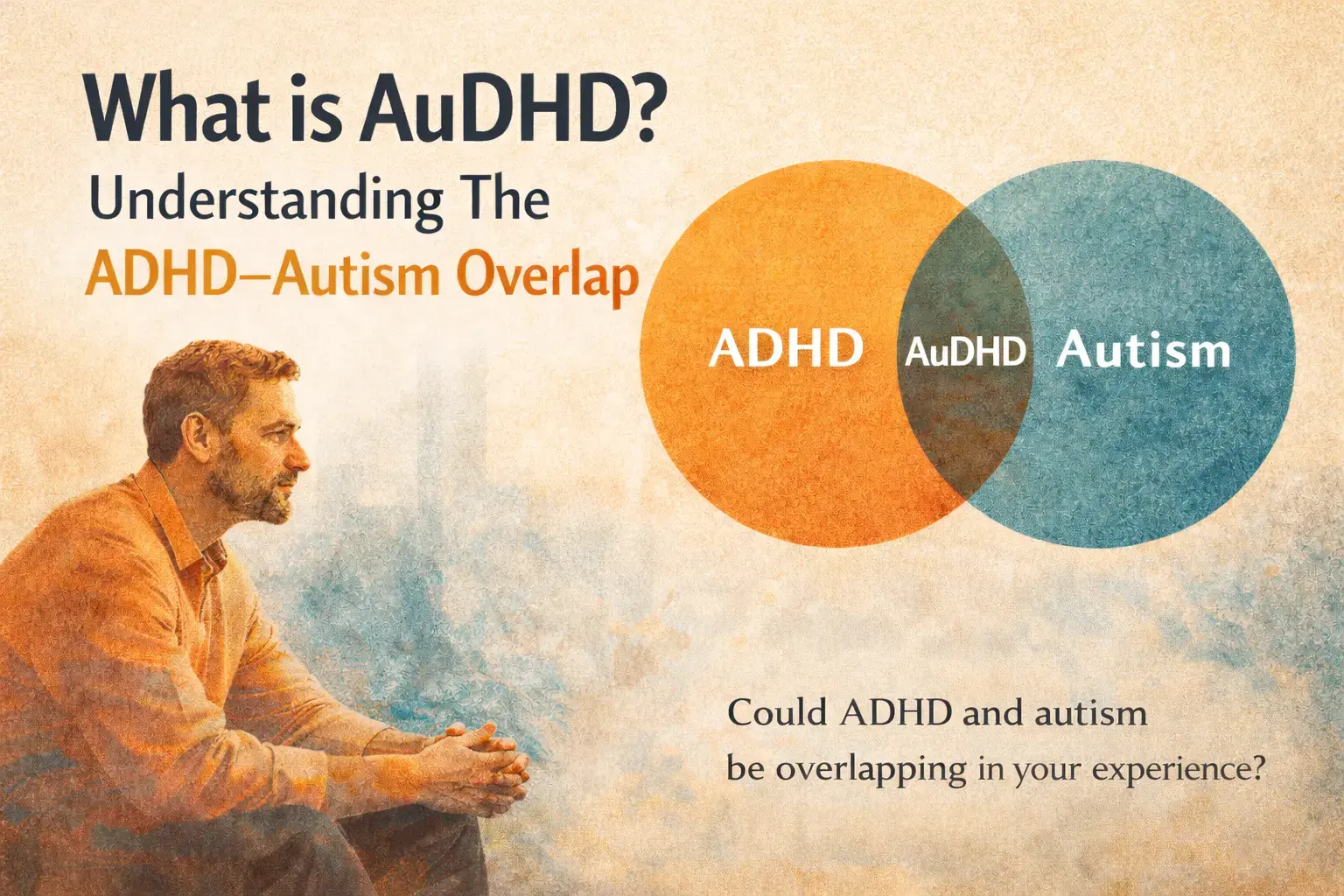Embracing Neurodiversity: How Therapy and Self-Compassion Foster Emotional Growth
“You are not a problem to be solved, but a person to be understood.” – Carl Rogers.
Recognizing that you are not broken brings relief and confidence. The traits you've questioned aren't flaws, but integral aspects of your unique self.
For many neurodivergent adults—whether you have ADHD, autism, giftedness, or sensory sensitivities—life can sometimes feel like you’re always trying to balance understanding yourself with meeting the world’s expectations. Maybe you’ve been told to tone it down, to try harder, or to fit in with ways of being that don’t match how your mind or body naturally works.
Emotional growth begins by embracing your authentic self. Neurodiversity-affirming therapy and self-compassion work to help you feel comfortable and empowered, rather than trying to change who you are.

The Power of Seeing Yourself Clearly: A New Lens on Neurodiversity
When therapy starts from the belief that your brain is not broken, the entire process shifts. Instead of chasing “normal,” we begin exploring you — your energy rhythms, sensory thresholds, emotional responses, and strengths.
Neurodiversity-affirming therapy creates space for curiosity. You and your therapist collaborate to understand how your nervous system communicates and what it needs to thrive — whether that’s structure, stimulation, solitude, or connection.
This lens reframes the narrative of struggle into one of understanding:
- Forgetfulness becomes a cue to explore executive function supports.
- Emotional sensitivity becomes evidence of depth and empathy.
- Hyperfocus transforms from a “distraction” to a strength that fuels creativity and flow.
At Becoming Yourself Counselling, we see therapy as a journey toward self-liberation—helping you gently unmask those parts of yourself that shame kept hidden, and rediscover how you naturally thrive.
Reflection Question: When was the last time you felt fully yourself — unmasked, unedited, and at ease? What helped that feeling emerge?
You might find deeper meaning in the role of identity in neurodivergent healing.
From Self-Judgment to Self-Compassion: Rewriting the Inner Narrative
Self-compassion is often misunderstood as passivity or self-indulgence. In truth, it’s one of the most powerful emotional regulation tools we have.
Many neurodivergent adults carry an inherited script of self-criticism:
“I should be more organized.”
“I shouldn’t get so emotional.”
“Other people manage — why can’t I?”
This constant self-surveillance reinforces shame and drains energy that could otherwise go toward healing or creative growth.
Self-compassion offers a radical alternative. Instead of meeting struggle with judgment, it invites us to respond with kindness—to say, “Of course this is hard; I’m human, and it’s okay to feel this way.”
In therapy, this might look like slowing down when frustration arises, grounding through breath before self-correcting, or learning to talk to yourself the way you would to someone you deeply care about.
As your inner critic softens, your self-trust grows—and with it comes more flexibility, resilience, and real self-acceptance.
Reflection Question: What tone does your inner voice take when you make a mistake or feel overwhelmed? How might you begin to speak to yourself differently?
Building on the foundation of self-compassion, effective therapy is also about collaboration. Here’s how personalized support can be tailored to your unique experience and needs.
No two neurodivergent minds are the same, so therapy shouldn’t look the same, either.
At Becoming Yourself Counselling, therapy is a collaborative process, blending various evidence-based methods—Acceptance and Commitment Therapy (ACT), Dialectical Behaviour Therapy (DBT), Compassion-Focused Therapy (CFT), mindfulness practices, and principles of polyvagal theory—and tailoring them to your unique ways of thinking, feeling, and experiencing the world. You’re never alone on this journey.
Instead of expecting you to fit into a rigid framework, we work with you to co-create a roadmap that reflects your lived experience.
Therapy adapts to your unique mind and needs, offering a flexible process for your emotional growth.
- If you struggle with overwhelm or emotional shutdown, we might use grounding techniques informed by polyvagal theory. These could include mindful breathing, body scanning, or movement exercises to help your body recognize cues of safety and return to regulation before problem-solving begins.
- If you find your thoughts spiralling into shame or perfectionism, compassion-focused exercises—such as guided self-kindness meditations or writing compassionate letters to yourself—can help reframe inner dialogue and soothe your nervous system’s threat response.
- If you need support building a daily structure, we may use strategies from executive-function coaching and Acceptance and Commitment Therapy. These include creating visual schedules, setting values-based goals, or breaking tasks into manageable steps that align with your personal values, rather than external pressures.
- If you’re navigating burnout or sensory fatigue, mindfulness practices may be modified for you, for example, using brief, movement-based exercises, gentle breathwork, or sensory-friendly grounding tools to help you reconnect gently without overwhelm.
At its heart, therapy is like a personalized toolkit—a blend of reflection, body awareness, and everyday strategies that honour the way your nervous system speaks.
Reflection Question: What types of support or structure help you feel most grounded and capable? How might therapy adapt to better meet those needs?
The Transformative Power of Self-Compassion in Everyday Life
Self-compassion isn’t just something you practice in therapy—it’s an everyday act that can transform how you see yourself and move through the world.
For neurodivergent adults, this can look like:
- Recognizing that needing rest is not weakness: it’s regulation.
- Allowing yourself to pause before responding when your nervous system feels flooded.
- Choosing to see effort, not outcome, as the accurate measure of progress.
- Offering yourself the grace to exist at your own rhythm, in your own space and time.
When you practice these small acts of compassion regularly, they help your body calm its stress response, lower tension, and bring your emotions back into balance.
Over time, this self-support rewires the brain toward greater safety and trust, creating conditions where authentic growth naturally follows.
Reflection Question: How would your life change if you treated yourself with the same kindness and patience you show to others?
A Personal Reflection: When Self-Acceptance Becomes the Turning Point
For a long time, I mistook control for growth. I believed that if I could just perfect my habits, manage my emotions, and keep everything neatly organized, peace would finally follow. I tried to earn balance through sheer effort and discipline, not realizing that what I really needed was self-compassion.
In therapy, I began to see the truth behind all that striving. What I thought was resilience was really fear in disguise — fear that if I stopped pushing, stopped proving, the whole structure of my life might collapse. I wasn’t chasing excellence; I was running from the feeling of not being enough.
Then one quiet afternoon, my therapist asked me a question that stopped me in my tracks:
“What if peace isn’t something you earn, but something you allow?”
Those words landed deep. I started thinking about how much of my life had revolved around earning — earning rest, earning love, earning the right to exist comfortably in my own skin. Somewhere along the way, I had forgotten that being human was never meant to be a performance.
That moment marked a quiet shift. I began to loosen my grip, to practice being, not just doing. It’s been slow work, but with each small step, I’ve learned that I don’t have to meet a condition to be worthy of care.
I still have restless days when my mind races or my body feels heavy. But now, instead of forcing myself through it, I pause. I breathe. I meet myself with a little more patience. I remind myself that I don’t need to be perfect: only present, only real.
And in that space of allowing, I’ve found something that feels a lot like peace.
This work is about finding your authentic self, not constant self-improvement. Therapy provides understanding, while self-compassion permits you to simply be.
My reflection on lived experience in Becoming Yourself – My Journey may also resonate.
Reflection Question: Where in your life are you still earning your worth? What would it look like to let yourself be enough, just as you are?
Moving Forward: Therapy as a Space to Become Yourself
Neurodiversity-affirming therapy isn’t about moulding you into someone else — it’s about creating conditions where your natural way of being can thrive.
When therapy honours both your mind and your nervous system, healing happens from within. You learn to recognize your strengths, adapt to your environment with intention, and meet your emotions with the same compassion you long to receive from others.
At Becoming Yourself Counselling, we’re here to hold space for your journey—where you can show up as your whole self, try out new tools, and gently unlearn the old belief that you have to earn your place.
You don’t have to fight your mind to find peace. You don’t have to be perfect to deserve rest.
Healing begins in the small moments, the ones where you pause before judging yourself, where you choose understanding over shame, where you allow compassion to soften what criticism once hardened.
Every time you offer yourself kindness, you’re pushing back against a world that once told you to shrink.
Your mind isn’t broken. It’s beautifully yours, and it’s ready to be understood.
If you’d like to understand the values that shape my neuroaffirming work, you can visit my About Michael page, where I share the foundations of my approach to compassion, healing, and acceptance.
If emotional exhaustion or burnout are themes in your life, you’re invited to connect through my contact page to explore support rooted in self-compassion.
Or stay on the blog and learn more about ADHD, Autism, and Giftedness.
FAQ: Neurodiversity Therapy and Self-Compassion
Q1: What is neurodiversity therapy?
A: Neurodiversity therapy recognizes conditions like ADHD, autism, or AuDHD as natural variations of the human mind. It focuses on understanding, adaptation, and self-compassion — not normalization.
Q2: How is therapy adapted for neurodivergent clients?
A: Sessions are customized around your sensory, communication, and emotional needs — whether that means flexible pacing, visual tools, or concrete structure. The process evolves with you.
Q3: Is self-compassion something that can be learned?
A: Yes. Through gentle practice and guidance, you can retrain the inner voice from criticism to care, which is an essential part of emotional regulation and growth.
Q4: What if I’ve been masking for years and don’t know who I am underneath?
A: That’s a common and valid experience. Therapy provides a safe space to explore your authentic identity at your own pace, supported by curiosity rather than pressure.
Q5: How do I start therapy at Becoming Yourself Counselling?
A: You can reach out for a free 20-minute consultation to explore if this approach feels right for you. Therapy can be in-person or virtual, accessible from anywhere in Ontario.
You might also explore Acceptance & Self-Compassion or Self-Compassion for Neurodivergent Burnout
Blog Disclaimer
This blog includes occasional personal anecdotes used to illustrate therapeutic ideas and foster connection. All identifying details have been altered or omitted to protect confidentiality. These reflections are intended as examples only; every individual’s experience is unique, and what resonates for one person may not apply to another.
The information provided here is for educational and informational purposes and should not be considered a substitute for professional medical or mental health advice, diagnosis, or treatment. If you have concerns about your health or well-being, please consult a qualified healthcare provider or licensed mental health professional.
Psychotherapy services described on this site are available to residents of Ontario. If you are interested in support or would like to schedule a complimentary 20-minute consultation, you are welcome to contact me through my practice.
These resources are offered to support your learning and self-understanding as you move toward a more grounded, authentic, and meaningful life.

Michael Holker HBA, BSW, MSW
Michael Holker, MSW, RSW, is the compassionate heart behind Becoming Yourself Counselling. Discovering his own neurodivergence later in life shaped his existential, humanistic, and strengths-based approach to therapy. Guided by his lived experience, Michael helps neurodivergent individuals move beyond self-criticism toward self-understanding, self-compassion, and self-acceptance. His work invites clients to honour their journeys, embrace their resilience, and reconnect with their authentic selves, cultivating a life of greater alignment and meaning.


